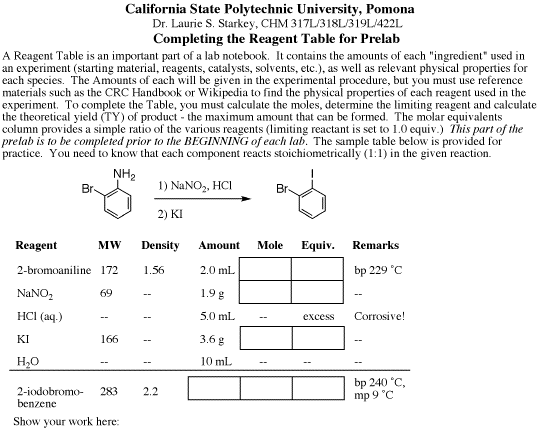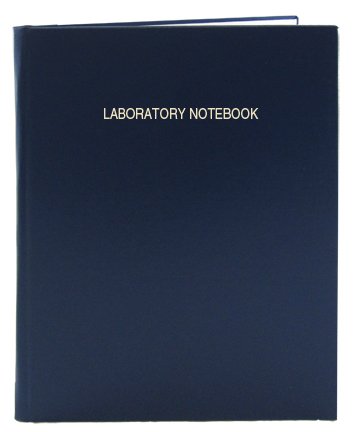The importance of keeping a chemistry lab notebook in good shape throughout any kind of laboratory session is HUGE.
Writing down and reporting what you do is the most important thing in science besides making observations. Especially if you are a student, you probably want to get better at organising a laboratory notebook. This is natural step while learning chemistry. On this article we will share keys, tips and tricks to handle this important task from the beginning.
Before we start with all our recommendations, if you want to jump real quick to our top recommendation for a lab notebook that will work for you in every case, check out the following one to fit all purposes:


But, what should a laboratory notebook contain? What information should you keep? Why should you keep record of things? What are the best options out there for lab notebooks? We will answer all these questions one by one.
Why is a lab notebook important in chemistry?
Chemistry is the experimental science by definition. We want to make observations to prove hypothesis. For this purpose, we perform experiments in the lab. But human memory is very limited. Not even the greatest scientific geniuses in history remember everything. For this reason, you need to keep track on what exactly you have performed, and write down the outcome of those experimental conditions. As we have remarked in other occasions, writing all your observations down is a master trick in any chemistry lab. Especially if you are taking a chemistry course at school, keeping a good student lab notebook is going to be the key to be successful!
Lab Notebook Format: What to Include in your Reports
Any laboratory session, from the first one that you take at school to the ones that I do in a daily basis as a chemistry researcher, starts with writing down your “hypothesis”, or your “problem” that you want to solve, or understand.
If you are about to run a synthetic chemistry reaction, the first thing you should write down is all the data a about that reaction:
- Write clearly the overall chemical equation: What are the reactants? (Left side) Which is the reaction product, or possible byproducts? (Right side) What are the reaction conditions? (Other reagents, solvent, temperature, time… Over the reaction arrow).

- Table of reagents: Typically you need to make a table with a list of all the reagents you use, its molecular weight, number of moles, number of equivalents, and other relevant data about the experiment.
This is how a reagent table typically looks like:

If you are taking organic chemistry courses, and you have trouble visualizing 3D structures, makes sure to get your hands into a chemistry model kit.
Recording your Procedures, Results and Observations
After all the appropriate preparation, you can jump into the actual chemistry experiment! But as you run it, you need to make as many observation as possible. The more the better, keep in mind that you will not remember everything afterwards. This is something that is hard to swallow at the beginning, but everybody ends up learning.
Do not limit yourself to writing the experimental procedure that you follow (which is obviously a basic requirement, including the different pieces of equipment and identifying all glassware that you use). Color changes in your chemical reactions, a mixture heating up (exothermic reaction), a solid precipitating from a reaction… Everything can be useful for coming up with a conclusion of the experiment!
To end up, the last step is putting everything you learnt together in your mind, and then writing it into the chemistry lab notebook. Learning how to extract conclusions and put them into words is one of the most important skills of a chemist. Why my reaction yield was low? In which experimental step could I have lost some product? Is there a byproduct forming? What caused that beautiful color change after adding the last reagent? These are great questions to ask yourself.
If you are doing organic chemistry, don’t forget to include data from your thin layer chromatography (TLC) on your lab report.
Buying the Appropriate Chemistry Lab Notebook
As for anything else, the bedrock of a good project is in the foundations. You need to buy a decent laboratory notebook for your sessions. Otherwise it will probably look messy, get damaged, or not look very good or professional. But worry not! We have some selected recommendations. I tested many lab notebooks over my years working in research. One of them which will fit your needs.
1. A Solid Professional Lab Notebooks to Fit Most Purposes
This kind of BookFactory lab notebooks are the ones that I actually use professionally. The cover and the pages are extremely resistant, you would have to try really hard to destroy it. You can buy them in several colors and with different pages (depending on how long your lab sessions are going to be), which is nice. As it should, this is a notebook with numbered pages, ruled pages, index, owner data page, and even some nice guidelines page. You cannot go wrong with this one:

2. Carbon Copy Notebooks: The Best Option for Student Labs
If you are taking a school or university chemistry course, there is nothing that can compare to carbon copy notebooks. Many universities are adapting to this format entirely, because it makes it easy for grading purposes: The student writes down their reports in the notebook, and everything gets carbon-copied to the page right after it. Then the copy can be handed in to the lab teacher for him to grade it. But it goes further than that: it can be very useful in profesional environments as well, since keeping records of everything is extremely important. Or maybe you are collaborating with a colleague and want to quickly share a piece of your notebook with them: this notebook is your solution. This is one of the best options that you can find.

I have tested these myself, and the copy works wonderfully. This notebook comes with 100 pages, and allows a perfect permanent documentation of any observations. The best thing is that, since you keep your own writing and hand in the copy to another person, if they need to grade it, you don’t need to wait until they give it back to check it any time. Besides, since you can hand in individual copies, you can use the very same chemistry lab notebook for all your courses or lab sessions! Back in the day when I was at school, I had one regular notebook for each course, and probably >80% of the space and paper ended up wasted. Not anymore!
3. Carbonless-Copy Student Lab Notebook
A clear alternative to carbon copy is another way of making non-electronic copies. Works similarly but basically does not use carbon, as you can probably tell. There are several options, but the most recommended one, and also quite affordable is this one:

4. More Affordable and Simple Lab Notebooks
If you want something simpler, more affordable and smaller, we got you covered. This recommendation will work especially well if you are just keeping track of your own chemistry experiments at home as a hobby chemist. It has plenty of pages, easier to handle and store due to its reduced size, very cheap and fairly resistant. The only downside is losing all the space that a regular A4 sized notebook offers, and in many cases is required.

5. The Definitive High End: BARBAKAM Carbonless Copy Lab Notebook
This is our personal best recommendation. We already have listed some of the advantages of having a carbon copy notebook. This performs great in the task of allowing you to hand in a copy of the pages to your professor, your boss, or your collaborators, and then you can keep all the originals for reference.

This notebook has 100 carbonless pages, but this is not its only feature. It comes with room for an index and personal data, but also plenty of reference pages! The periodic table of elements, common NMR shifts, formulas for calculating molarity and concentrations of typical solutions, metric units and conversion factors, properties of common acids and bases, or properties of solvents. This is something that you would use on a daily basis either as a student (I did) or as a professional chemist (I do). It is an awesome complement for a chemistry lab notebook. If I ever have to choose a notebook for a university or company department, it would probably be this one.
Enjoy your New Lab Notebook, and Fill it with Wonderful Chemistry!
Now that you have already selected and bought your new notebook, the only thing left is to fill it with all your observations and conclusions.
Do you need to write a report in a word processor afterwards? Check out our post on how to draw chemical structures in Word and much more!
You are now ready to ace your lab sessions if you are a student, to keep perfect record of your research if you are a professional, or just enjoy chemistry if you are a hobby scientist doing chemistry experiments at home!




This website was… how do you say it? Relevant!! Finally I’ve found something which helped me.
Appreciate it!